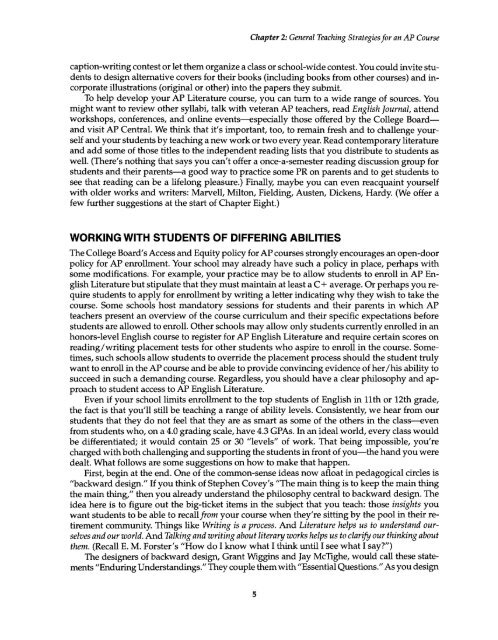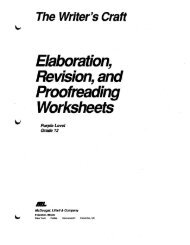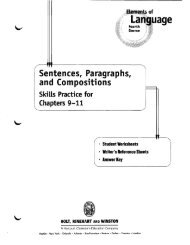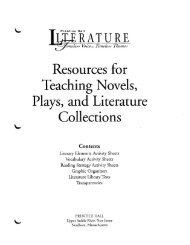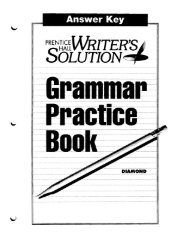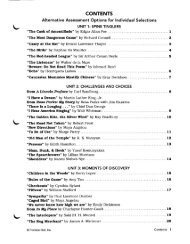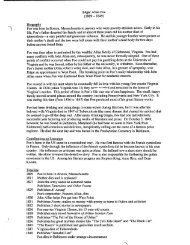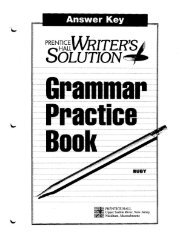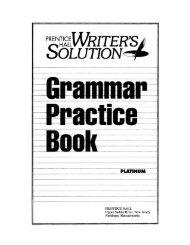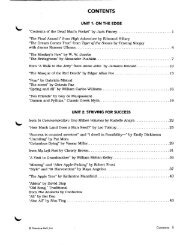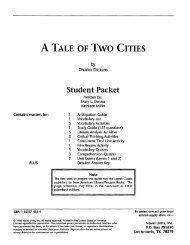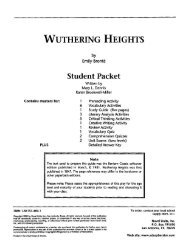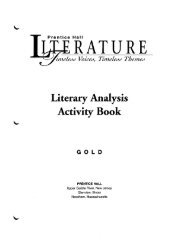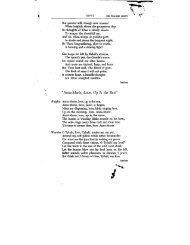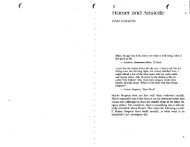English Literature & Composition - PopulationMe.com
English Literature & Composition - PopulationMe.com
English Literature & Composition - PopulationMe.com
You also want an ePaper? Increase the reach of your titles
YUMPU automatically turns print PDFs into web optimized ePapers that Google loves.
Chapter 2: General Teaching Strategies for an AP Course<br />
caption-writing contest or let them organize a class or school-wide contest. You could invite students<br />
to design alternative covers for their books (including books from other courses) and incorporate<br />
illustrations (original or other) into the papers they submit.<br />
To help develop your AP <strong>Literature</strong> course, you can tum to a wide range of sources. You<br />
might want to review other syllabi, talk with veteran AP teachers, read <strong>English</strong> Journal, attend<br />
workshops, conferences, and online events---especially those offered by the College Boardand<br />
visit AP Central. We think that it's important, too, to remain fresh and to challenge yourself<br />
and your students by teaching a new work or two every year. Read contemporary literature<br />
and add some of those titles to the independent reading lists that you distribute to students as<br />
well. (There's nothing that says you can't offer a once-a-semester reading discussion group for<br />
students and their parents-a good way to practice some PR on parents and to get students to<br />
see that reading can be a lifelong pleasure.) Finally, maybe you can even reacquaint yourself<br />
with older works and writers: Marvell, Milton, Fielding, Austen, Dickens, Hardy. (We offer a<br />
few further suggestions at the start of Chapter Eight.)<br />
WORKING WITH STUDENTS OF DIFFERING ABILITIES<br />
The College Board's Access and Equity policy for AP courses strongly encourages an open-door<br />
policy for AP enrollment. Your school may already have such a policy in place, perhaps with<br />
some modifications. For example, your practice may be to allow students to enroll in AP <strong>English</strong><br />
<strong>Literature</strong> but stipulate that they must maintain at least a C + average. Or perhaps you require<br />
students to apply for enrollment by writing a letter indicating why they wish to take the<br />
course. Some schools host mandatory sessions for students and their parents in which AP<br />
teachers present an overview of the course curriculum and their specific expectations before<br />
students are allowed to enroll. Other schools may allow only students currently enrolled in an<br />
honors-level <strong>English</strong> course to register for AP <strong>English</strong> <strong>Literature</strong> and require certain scores on<br />
reading/writing placement tests for other students who aspire to enroll in the course. Sometimes,<br />
such schools allow students to override the placement process should the student truly<br />
want to enroll in the AP course and be able to provide convincing evidence of her/his ability to<br />
succeed in such a demanding course. Regardless, you should have a clear philosophy and approach<br />
to student access to AP <strong>English</strong> <strong>Literature</strong>.<br />
Even if your school limits enrollment to the top students of <strong>English</strong> in 11th or 12th grade,<br />
the fact is that you'll still be teaching a range of ability levels. Consistently, we hear from our<br />
students that they do not feel that they are as smart as some of the others in the class---even<br />
from students who, on a 4.0 grading scale, have 4.3 GPAs. In an ideal world, every class would<br />
be differentiated; it would contain 25 or 30 "levels" of work. That being impossible, you're<br />
charged with both challenging and supporting the students in front of you-the hand you were<br />
dealt. What follows are some suggestions on how to make that happen.<br />
First, begin at the end. One of the <strong>com</strong>mon-sense ideas now afloat in pedagogical circles is<br />
"backward design." Ifyou think of Stephen Covey's "The main thing is to keep the main thing<br />
the main thing," then you already understand the philosophy central to backward design. The<br />
idea here is to figure out the big-ticket items in the subject that you teach: those insights you<br />
want students to be able to recall from your course when they're sitting by the pool in their retirement<br />
<strong>com</strong>munity. Things like Writing is a process. And <strong>Literature</strong> helps us to understand ourselves<br />
and our world. And Talking and writing about literary works helps us to clarify our thinking about<br />
them. (Recall E. M. Forster's "How do I know what I think until I see what I say?")<br />
The designers of backward design, Grant Wiggins and Jay McTighe, would call these statements<br />
"Enduring Understandings." They couple them with "Essential Questions." As you design<br />
5


